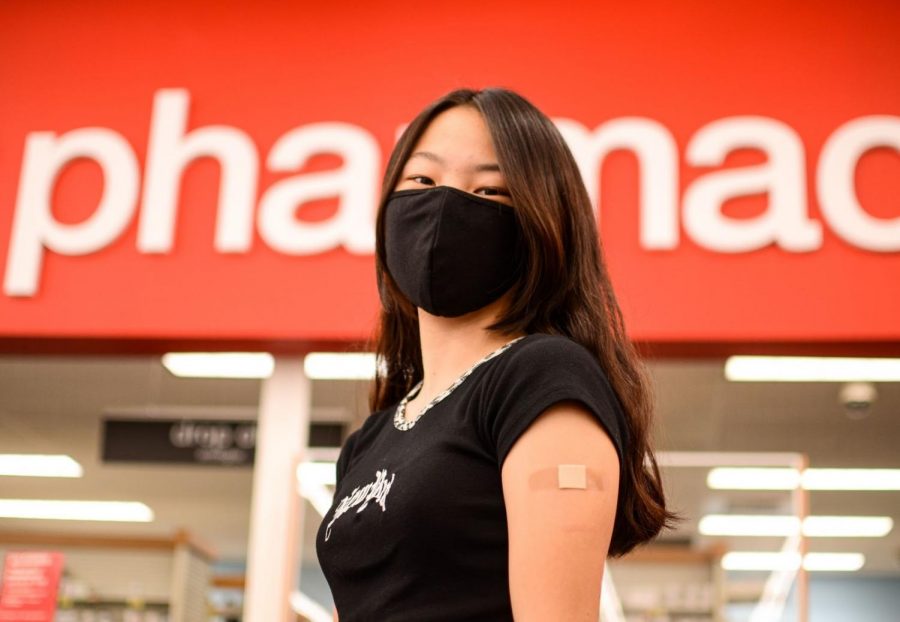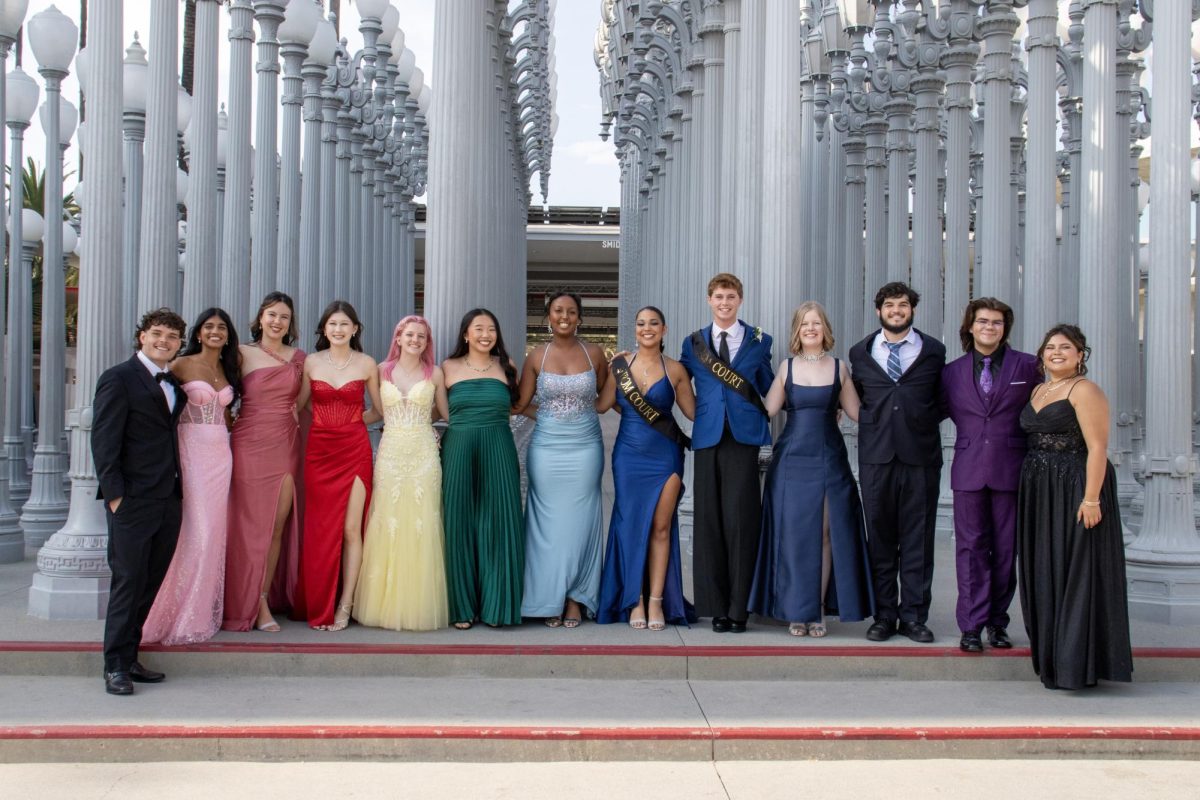Why Students Should Get the COVID-19 Vaccine
Art/Photo by Sullivan Kolakowski
Right after her 16th birthday, Paityn Yamasaki (10) made it a priority to get vaccinated. She explained how getting a vaccine is a simple procedure: “It’s a very easy process and can go by quickly depending on how busy they are. Make sure to bring your school ID and birth certificate so they can identify you.”
April 25, 2021
“April 15, 2021, in the state of California, is not Tax Day,” Governor Gavin Newsom declared. “It’s ‘Vax Day.’”
Since then, all Californians aged 16 and up have become eligible to receive their COVID-19 vaccines. What does this mean for West? Over half of our student body can become vaccinated. But the effects of widespread vaccination reach beyond the gates of campus into the larger community of everyday lives. Students at West must get the COVID-19 vaccine – for both medical and moral reasons.
Scientifically-proven and doctor-approved, COVID-19 vaccines are the single most effective method of preventing widespread infection and bringing the pandemic to a close. As indicated by large clinical trials, the CDC proclaimed that “COVID-19 vaccination prevented most people from getting COVID-19.” Among those with no signs of past infection, the Pfizer and Moderna vaccines were respectively found to be 95% and 94.1% effective “at preventing laboratory-confirmed COVID-19 illness.”
For grandparents and teenagers alike, getting vaccinated is essential in protecting against disease contraction. Dr. Jessica Perniciaro, a pediatric emergency medicine physician at Children’s Hospital Los Angeles, described a current issue concerning COVID complications for youth: “Although it seems to be rare that healthy children get seriously ill from the initial COVID infection, we are seeing children and teenagers who are getting very ill from the inflammatory syndrome that can happen after COVID, called Multisystem Inflammatory Syndrome in Children, or MIS-C.” Perfectly healthy teens without past medical issues are still susceptible to the complications of MIS-C. Other concerns have emerged over variants of the virus that can cause COVID-19, some of which may cause illness more severe in youth than in adults. Dr. Perniciaro noted that “these variants could become more prevalent in the U.S. as time goes on.”
While vaccines play an integral part in ending the pandemic, vaccine hesitancy hinders the process. Hesitancy stems partly from concerns about potential side effects: The New York Times reported that distribution of Johnson & Johnson’s single-dose COVID vaccine was recently paused on account of a rare blood clotting disorder seen in seven women and one man.
Although the possible side effects are potentially severe, the risk is exceptionally low. 0.0001% of the roughly 7 million people in the U.S. who have received the Johnson & Johnson vaccine have been affected by the clotting disorder. Furthermore, an Oxford study revealed that the chance of having severe blood clotting is actually many times greater in people who have contracted COVID-19 than in people who have received the Astra-Zeneca, Pfizer, or Moderna vaccines. The overwhelming benefits outweigh the small risks, and provide the strongest defense line against the consequences of contracting COVID-19.
By the time most teens enter high school, the vast majority have already been vaccinated for over a dozen viruses and bacteria. Vaccination is not a new practice, nor something to feel uncertain about. Paityn Yamasaki (10) has received the first of her two vaccine doses. Aside from feeling sore in her arm, she “felt fine and had no side effects.” Similar to the many times nearly all students have been vaccinated for other diseases, now is the time to take another one. But unlike childhood vaccinations which target more rare diseases, the COVID-19 vaccine has the potential to prevent infection of a widespread, pandemic-level pathogen.
While the United States holds 4.25% of the world’s population, it is also home to about 19% of the world’s COVID-19 deaths – more than any other country. Our death toll is nearly equal to that of Brazil and Mexico combined – the 2nd and 3rd countries with the most COVID-related deaths. The fact that COVID-19 even became a pandemic is a testament to how extremely vital getting vaccinated is.
Vaccination is not just medically essential for the general population; it is a moral responsibility. The length and severity of the pandemic ethically obligate us to ensure that there will only be as few months left as possible. As friends, students, teammates, siblings, children, grandchildren, and human beings, there is an everlasting obligation to take care of the people we love. According to Dr. Perniciaro, vaccination is “especially important as teenagers are going back to in-person school and participating in sports and other activities.”
Getting vaccinated is currently one of the most effective ways to protect the people in our lives: “The more of the population that is vaccinated, the lower our chances are of having additional surges,” Dr. Perniciaro explained.
Nevertheless, the reward of vaccination extends beyond moral principles and into the tangible world. According to the CDC, individuals who have been fully vaccinated are allowed to carry out many activities quite reminiscent of a normal life. Though “medium or large gatherings” are still ill-advised, full vaccination opens many doors of opportunity: you can “visit inside a home or private setting without a mask with other fully vaccinated people of any age” or with “one household of unvaccinated people who are not at risk for severe illness.” Elizabeth Richey (12), who has received both doses of the Pfizer vaccine, added that “not only does it create a safer environment, but it could help with bringing back school events like attending games and watching shows in the PAC [Performing Arts Center].”
The COVID-19 vaccine is the key to unlocking the pandemic prison. Widespread vaccination will not only prevent death and disease, but also open the gateway to a familiar world. Imagine going to school with all of your friends; sitting down inside your favorite restaurant; being cheered on at your sports games by a roaring crowd. Getting vaccinated is your chance for that life to be yours.
The time has come for you to take your COVID-19 vaccine. Visit the link below to schedule your appointment today: myturn.ca.gov.






